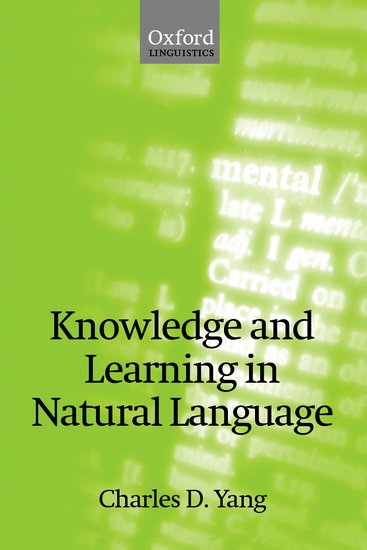Knowledge and Learning in
Natural Language

2002 Oxford University Press
Get it here: some typos corrected in Chapter 5 though the errors in appendix of Chapter 3, which are obvious, somewhat survided to the printer.
"Yang's carefully crafted and impressively argued study is a
significant contribution to the exciting field of language acquisition,
and cognitive growth more generally. He has shown how conceptions of
'universal grammar' can be integrated with precise ideas about
learning/growth mechanisms within a variational model of language
acquisition that yields sharp and well-confirmed predictions over quite
an interesting range, with implications for language change as well. It
is a substantial achievement, sure to become the basis for much
fruitful inquiry and research."--Noam
Chomsky
"According to Yang, many of today's irregular verbs are historical
survivors of what were once systematic rules ... By neglecting this
historical evidence Pinker mistakenly supposes that the irregular cases
have to be memorized on a case-by-case basis, whereas according to Yang
what has to be memorized is which rule applies. Yang strengthens his
argument by bringing in evidence from other languages. Yang argues that
these irregular patterns are rule-based and that the child's task is
not to memorize plurals on a word-by-word basis, but to figure out
which rule applies, to which set the noun belongs. If Yang is right,
and I think he is, then Pinker's irregulars are not illustrations of
the words-and-rules thesis, but the
less-general-rules-and-more-general-rules thesis."--John Searle, The New York Review of Books
"Who would have thought that there could be a synthesis of mathematical
learning theory, natural selection and Universal Grammar that is both
readable and convincing? Charles Yang has succeeded, and in the process
illuminates many phenomena in child language that are perplexing under
alternative accounts."--Jill de
Villiers, Sophia and Austen Smith Professor of Psychology and
Philosophy, Smith College

